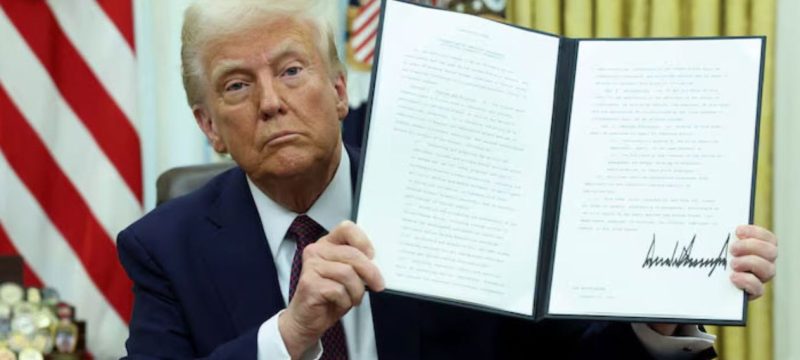Former U.S. President Donald Trump has unveiled plans to impose a 25% tariff on imports from the European Union, claiming that the bloc was designed to undermine American economic interests.
During a cabinet meeting on Wednesday, Trump reiterated his concerns over trade imbalances, arguing that the U.S. gains little in return for allowing European goods into its market. “It’ll be 25 percent, generally speaking,” he stated, specifying that the tariffs would target automobiles and various other products.
Read more: Netanyahu Backs Trump’s Gaza Plan Amid Regional Concerns
He further accused the EU of unfair trade practices, asserting that European nations “do not accept U.S. cars and farm products” while benefiting from access to American markets. Currently, the EU imposes a 10% tariff on U.S. car imports, whereas the U.S. charges only 2.5% on European passenger vehicles, although it maintains a 25% duty on imported pickup trucks.
Trump went on to make a controversial claim about the EU’s foundation, saying, “The European Union was formed to take advantage of the United States, and they have done a very good job of it.”
EU’s Strong Response
Trump’s remarks triggered an immediate and firm reaction from the European Commission, which rejected his allegations and vowed to respond to any protectionist measures.
“The EU will firmly and immediately counter any unjustified trade barriers, including the use of tariffs to challenge legal and non-discriminatory policies,” a spokesperson stated. “We will continue to protect European businesses, workers, and consumers from unfair trade practices.”
Prominent European politicians also criticized Trump’s stance. Gérard Araud, France’s former ambassador to the U.S., wrote on X (formerly Twitter), “Trump hates the EU. He doesn’t really understand it, but he hates it.” Meanwhile, former Swedish Prime Minister Carl Bildt dismissed Trump’s claims about the EU’s purpose, stating that the bloc was created to “prevent wars in Europe, not to undermine the U.S.”
Growing Tensions in Transatlantic Relations
Trump’s latest trade threat comes amid already strained U.S.-EU relations, exacerbated by his administration’s “America First” policies.
Beyond trade conflicts, Trump’s stance on NATO and the ongoing war in Ukraine has heightened European concerns. His criticism of U.S. military commitments and close interactions with Russian President Vladimir Putin have raised doubts about Washington’s role in the alliance.
Trump has pledged to “quickly end the war in Ukraine,” leading to speculation that his approach may favor Moscow. European leaders fear that any potential peace deal under his administration could result in territorial concessions to Russia.
German Chancellor-in-waiting Friedrich Merz, whose CDU/CSU party recently won the parliamentary elections, warned that Europe must prepare for a future without guaranteed U.S. security support. “A significant portion of Americans care very little about Europe’s fate,” Merz remarked, adding that NATO’s structure could change drastically in the near future, possibly pushing the EU to strengthen its independent defense capabilities.
Meanwhile, U.S. Secretary of State Marco Rubio downplayed concerns about NATO’s future in an interview with Fox News, emphasizing that the alliance remains intact but urging European nations to invest more in their defense. “NATO is not at risk. The real issue is that many NATO members, particularly in Western Europe, have underfunded their militaries for decades. They have the resources, but they aren’t using them effectively,” Rubio said.









